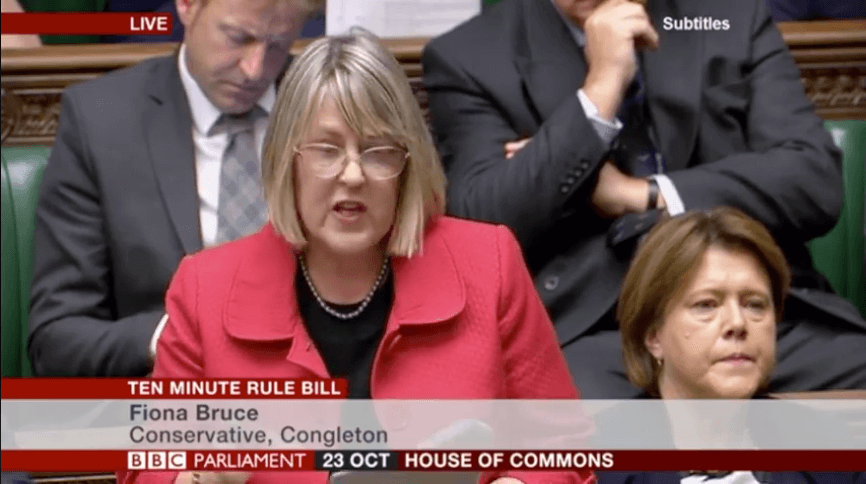Campaigners are relieved that a radical abortion motion brought forward by Diana Johnson, that passed by 208 to 123 votes, is very unlikely to become law.
The motion sought to impose abortion on Northern Ireland and remove many of the current legal safeguards around abortion provision in England and Wales. As it was a Ten Minute Rule Motion, it is very unlikely it will be given further time by the Government to be debated in Parliament. It even less likely that it will become law.
Polling from ComRes released last week showed a strong majority of women in Northern Ireland reject interference from Westminster on this sensitive issue with two-thirds agreeing that this was a decision for Northern Ireland. The strongest support among age groups surveyed came from the youngest age group, 18-34 year olds, with 70% agreeing that they did not want abortion law imposed on Northern Ireland from Westminster. Polling released earlier this year also showed a huge majority – 72% – of Conservative MPs are against devolution being undermined by imposing abortion laws on Northern Ireland.
Polling shows that Diana Johnson’s proposals for England and Wales are out of line with public opinion in these regions with the majority of women wanting more not less safeguards around abortion. 70% of women polled believe that the current 24-week gestational limit for abortion should be reduced, and 93% of women wanting an explicit ban on sex-selective abortion.
Conservative MP for Congleton, Fiona Bruce, speaking in the debate said:
“It proposes far reaching changes in abortion law, not only in England and Wales but also for Northern Ireland, where abortion has been respected as a devolved matter since 1921. Indeed, it would set a dangerous constitutional precedent of interference.
“It is not only unconstitutional, it’s untimely. At such a sensitive time in relations between the Westminster government and the Northern Ireland administration, it would completely undermine the substance and spirit of the Good Friday Agreement.
“And it is unwanted. Northern Ireland is the most recent part of the UK to vote on abortion law in 2016 and by a clear majority to retain their law as it stands. The people of Northern Ireland said just last week when asked, 66% of women there and 70% of 18 – 34’s said that Westminster should not dictate this change to them. If, however, the provence in time decides to change their law that is for them, not for us here in Westminster, to decide.”
A spokesperson for Right To Life, Clare McCarthy said:
“Ms Johnson’s bill goes a lot further than seeking to impose abortion legislation on Northern Ireland. If these proposals were to become law, it would bring about one of the world’s most extreme abortion laws. This Bill would have the effect of making the Abortion Act 1967, along with most of the legal safeguards it provides, void through to at least 24-weeks, i.e over five months, gestation.
Recent polling also shows that this move is wildly out of step with public opinion who would actually support more restrictions on the current abortion law in the UK. In fact, 70% of women polled believe that the current 24-week gestational limit for abortion should be reduced. In Britain, abortions can be performed until the 24th week, far beyond the European median of 12 weeks.
Diana Johnson’s Bill is very unlikely to become law but should these extreme proposals ever reach the stages of legislative debate in the house, we are hopeful that politicians in Westminster would unite against them in respect of public opinion and of democracy in Northern Ireland.”
ENDS
- For additional quotes and media interviews contact 07847 454108 or email press@righttolife.org.uk
- For further information on Right To Life visit www.righttolife.org.uk
- Secretary of State for Northern Ireland, Karen Bradley stated in the Houses of Parliament recently (September 5, 2018) that:
- “Abortion is a devolved matter in Northern Ireland and this means it is only right that questions of laws and policy on abortion, including the legality of any medicines, are decided by a devolved government.”
- Deputy chair of the Conservative party James Cleverly has spoken out about abortion and devolution:
- “You can’t claim to respect NI devolution but then demand that it be ignored because an issue is ‘important’,” he said. “The sensitivity about saying ‘the Republic of Ireland have done it so Northern Ireland should do it too’ cannot be overstated either.”
- Ruth Davidson, leader of the Scottish Conservative Party has also warned against imposing abortion laws on Northern Ireland:
- “If I was a politician in Northern Ireland, I would absolutely 100% vote to change the law. But as someone who operates in a devolved administration, I know how angry I would be if the House of Commons legislated on a domestic Scottish issue over the head of Holyrood”.
- In a House of Commons debate (June 5, 2018) SNP MP Deirdre Brock MP said:
- “Likewise, the issue of abortion in Northern Ireland is a devolved matter and is an issue for the people of the Northern Ireland and the people they elect to the Assembly. It is a matter devolved and, frankly, it matters not a jot whether the decisions made at Stormont, when it is sitting, are agreeable to Members sitting here. That is the point of devolution, a point that some Members of this place have been spectacularly slow to appreciate at times. The decisions of devolved Administrations are taken for reasons that people in those devolved nations understand from their point of view, and they are taken using evidence that the people, politicians and policymakers of those devolved nations consider important.”


